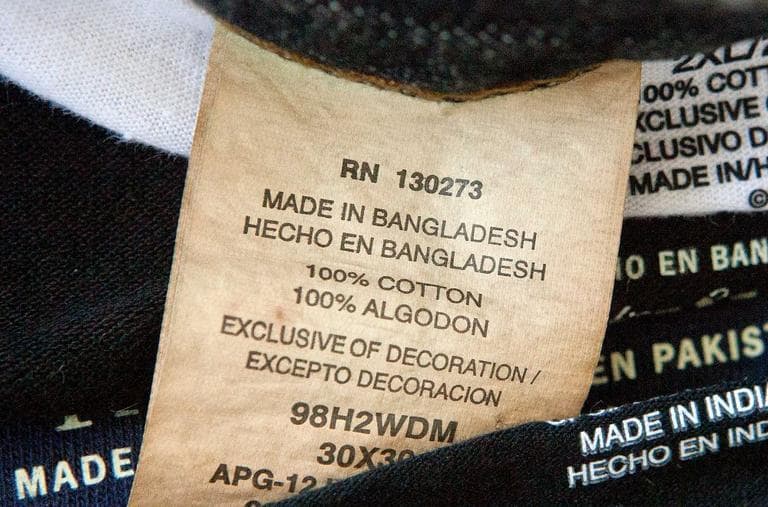Advertisement
What Your T-Shirt Label Doesn't Reveal
Resume
After last month's devastating garment factory collapse in Bangladesh, are you taking a second look at the labels in your clothing? If you find a "Made in Bangladesh" label, is it chilling?
Dara O'Rourke, associate professor at the University of California, Berkeley, is co-founder of the Good Guide, a website and smartphone app that provides consumers with consumer product evaluations based on health, environmental and social impacts.
"The scale and continuous nature of these tragedies, I think, is having more and more consumers, and more and more people in the U.S. and Europe are stopping and wondering, are there really some hidden costs behind these low, low prices that they've been benefiting from in the store," O'Rourke told Here & Now's Robin Young.
"Some of the things we see that are sewn, that say 'Made in Italy,' may not actually be made in Italy."
Dara O'Rourke
Boycotts Not The Answer
At $38 per month, Bangladesh has the lowest wages in the world for apparel, O'Rourke said. Disney has announced it will end clothing production in Bangladesh, and some people have said they are boycotting clothing made in Bangladesh.
But is that the answer?
"The advocacy community, the labor unions and the labor NGOs and the student movement have not been calling for a boycott of Bangladesh, have not been calling for companies to cut and run, if you will, but rather for them to commit to investing and actually improving conditions," O'Rourke said.
Safety Pledge For Retailers
Virtually all of the major European retailers and brands have signed onto a binding safety pledge to underwrite the costs of improving conditions in Bangladesh, O'Rourke said.
But U.S. retailers, including the Gap, J.C. Penney, Children's Place, Walmart are notably absent.
"I think it is a smoke screen for industry to say, 'This is too complicated. It's too unwieldy. It's not flexible enough. We want to just go on our own and solve the problems.' That's what the Gap said, that's what Walmart said this week. Them going it alone, them hiring their own private consulting firms to audit these factories and then keeping that information confidential has proven not to work," O'Rourke said.
You Can't Trust The Label
Adding another level of complexity is something called "trans-shipping."
The U.S. gives each country in the world a set amount of product they can import to the U.S., O'Rourke said. So if a China has met its quota, a factory there might ship the product to another country and put the label on there.
"Some of the things we see that are sewn, that say 'Made in Italy,' may not actually be made in Italy, but they're trans-shipped. The label is literally sewn on in Italy," he said.
A Role For Consumers
To get U.S. retailers and brands on board with the Bangladesh accord, shoppers can't be passive anymore, O'Rourke said.
"You should be tweeting a question to your favorite brand: 'Hey, @Gap, why won't you sign the Bangladesh accord. Hey @jcpenney, hey @childrensplace,'" he said. "You should be asking publicly, what are they doing to improve conditions in Bangladesh."
Guest:
- Dara O'Rourke, associate professor at The University of California, Berkeley, co-founder of the Good Guide. He tweets @DaraORourke.
This segment aired on May 17, 2013.